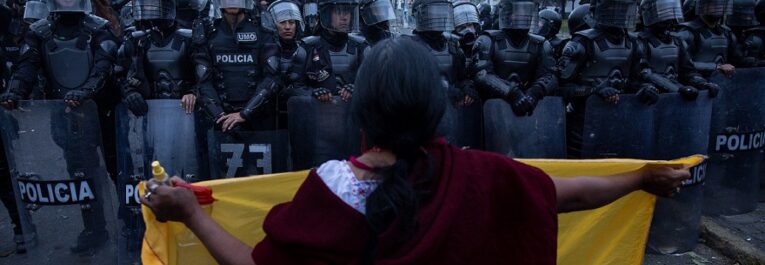
PRESS RELEASE
Quito, Geneva, 25 March 2024 – CETIM1 and UDAPT (Unión de Afectados y Afectadas por las Operaciones Petroleras de Texaco) submitted a written statement to the 55th session of the UN Human Rights Council on the alarming deterioration of human rights in Ecuador. One of the safest countries in Latin America until 2017, by 2024 Ecuador was the most violent country in the region, with an average of 40 violent deaths per 100,000 inhabitants. In some areas, such as La Nueva Prosperina in Guayaquil, the average is 114 violent deaths.
Transnational organized crime, which has shifted its operations to Ecuador, has made the country the leading exporter of drugs to Europe, far outstripping the tonnes of cocaine coming from Brazil and Colombia. At the same time, since 2017 Ecuador has seen a drastic rise in neoliberal policies aimed at dismantling the State and privatizing all sectors of the economy. This has led to an increase in poverty, unemployment and corruption, as well as the dismissal of thousands of public employees. Other consequences include public spending cuts, the abolition of public bodies and the abandonment of security-related policies.2
The neoliberal strategy of dismantling the State has also weakened oversight mechanisms in the financial system, allowing organized crime to launder more than $3 billion a year. The mafia now controls numbers of judges, prosecutors, police officers, prison guards and military, who protect, facilitate or permit criminal activities to flourish with impunity.
Another feature of Ecuador’s neoliberal offensive is the entry into force of investment protection treaties aimed at safeguarding the interests of the mining and oil companies of the extractive industry at the expense of the rights of indigenous and peasant communities.3 Moreover, a referendum has been called to allow the country to join private international arbitration bodies, on the pretext of encouraging foreign investment. In reality, the aim is to undermine the sovereignty of the State.
Faced with this situation, President Noboa’s government has proclaimed a state of emergency. Public demonstrations have been banned, violation of domicile authorized and the country placed under martial law. The government has also given itself the power to impose total social control.
Under the state of emergency, several cases of illegal detention, extrajudicial execution and torture of detainees have already been identified.
These acts are a violation of human rights, in particular collective rights and economic, social and cultural rights. It is becoming increasingly clear that, with the adoption of trade agreements and the imposition of neoliberal policies, transnational corporations increase their power and can continue their extractive activities with impunity, destroying nature and biodiversity and damaging human health. In addition, these powerful companies use criminal groups to pursue the mining of natural resources, resorting to intimidatory tactics, persecuting leaders and using armed violence against communities.
Accordingly, CETIM and UDAPT call on the Ecuadorian government to respect its international human rights commitments, notably in respect of economic, social and cultural rights. We also call for an end to the dismantling of State structures and the privatization of public bodies and companies, a process that is weakening the capacity to effectively protect the human rights of the population.
Read the written statement submitted to the Human Rights Council (in Spanish)
Watch the video of CETIM’s statement to the Human Rights Council plenary (in French)
Contacts:
Raffaele Morgantini, CETIM representative to the UN, raffaele@cetim.ch. +41796606514
Pablo Fajardo, UDAPT Legal Counsel +5930993977811, pablofajardom@gmail.com
Patricio Saravia, UDAPT Communications Manager patriciosaraviavega@yahoo.es +5930994220300
1 CETIM is an association with consultative status at the United Nations.
2 The shrinking of the State has resulted in the de facto control of prisons by criminal groups, who have turned them into criminal fiefdoms. The prison massacres that took place between 2020 and 2023 were the result of a war between the drug cartels for control of the prisons (412 inmates killed in 11 massacres).
3 The residents of Palo Quemado, in the Cotopaxi region, face State security forces that flout the human rights of communities opposed to mining and treat social and environmental protests as criminal offences.